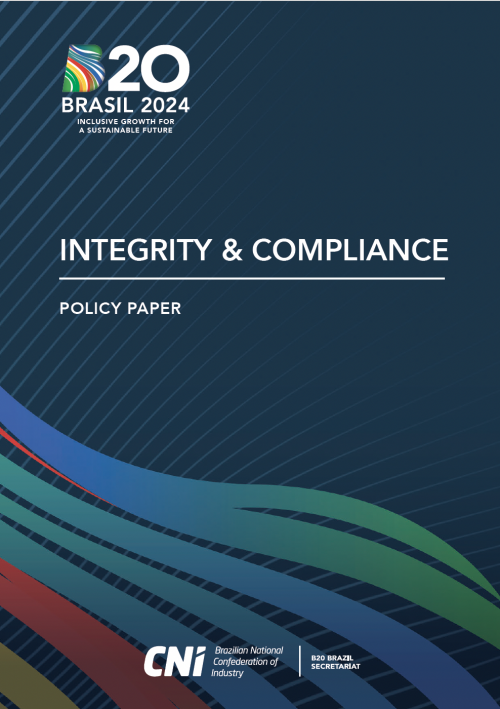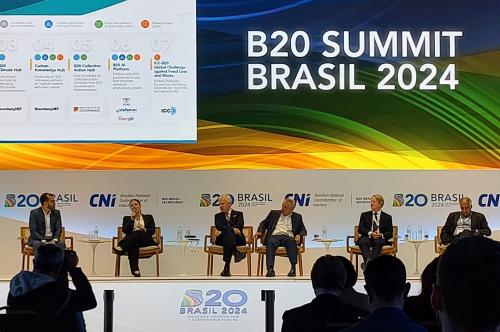Fighting corruption in Latin America: Can Collective Action help close the gaps?

As we expand our efforts to support Collective Action against corruption in Latin America, Private Sector Specialist Andrea Prieto takes stock of existing initiatives in the region. She and representatives from some of the initiatives discussed the Collective Action approach to fighting corruption in Lima, Peru at the Eighth Integrity Week organised by Alliance for Integrity.
También disponible en español.
Changing the status quo
Covid-19, inflation and social unrest have sent Latin America into economic stagnation. Corruption exacerbates the region’s economic woes. It is estimated to cost the region’s economies a staggering USD 220 billion annually and is responsible for about 50% of the total effect of the economic slowdown.
Nobody but the corrupt benefits from corruption. It inhibits economic development, discourages investment, hinders innovation, distorts markets and increases the cost of doing business.
But there is good news. There is a growing understanding that action on corruption is a collective responsibility that requires the cooperation of the public, private and also civil society sectors. This shift has led to:
- New regulations for the private sector;
- a greater emphasis on corporate accountability;
- demand for corruption prevention programmes and strategies at the corporate level.
In parallel, businesses in Latin America are increasingly developing sustainable business strategies. These look beyond short-term profits towards sustainable long-term growth that not only benefits the company, but strengthens economic stability and competitive markets.
As a result, the private sector in Latin America has become more engaged in the fight against corruption.
Building trust through Collective Action
A lack of trust between private-sector actors and other stakeholders is a critical hurdle to advancing the anti-corruption agenda. Collective Action offers a tried-and-tested methodology to build trust and develop collaborative approaches across stakeholder divides. These collaborative approaches support the design and implementation of corruption prevention measures and initiatives that are effective even in challenging contexts.
The B20 Collective Action Hub by the Basel Institute on Governance has mapped more than 60 Collective Action initiatives operating across a range of sectors in 12 countries in Central and South America. These initiatives range from joint declarations to anti-corruption certification schemes. We also see tools to safeguard public procurement, like Integrity Pacts and High Level Reporting Mechanisms.
The following initiatives give a taster of different types of initiatives and their impact:
Collective Action leading to regulatory reform
One successful example of how Collective Action can lead to legal or regulatory reform is the Maritime Anti-Corruption Network (MACN). The MACN is a global business-led network that aims for a maritime industry free of corruption.
In Argentina in 2014, the MACN detected, through its anonymous incident reporting system, reports of irregular demands for money for routine inspections in bulk carriers in Argentina. The bribery was estimated at approximately USD 30 million a year. It affected not only those forced to pay bribes to get the paperwork they needed, but also the overall international trade of Argentine agricultural products. The higher costs and the increased legal risk had begun to discourage foreign companies from continuing to trade in the country.
The MACN worked with trade unions and chambers of commerce to identify corruption risks, gather relevant actors, build trust and find ways to solve the issue.
Thanks to this action and by collective agreement, the Servicio Nacional de Sanidad y Calidad Agroalimentaria (National Agri-food Health and Quality Service) reformed the regulatory framework in November 2017. This resulted in the adoption of a modern control system that digitises the management of inspections and establishes a system of cross controls.
The Collective Action process was expanded to include the training and monitoring of all public and private actors in the new system. It is estimated that bribes decreased by more than 90 percent, significantly reducing the cost per ship of entering Argentina harbours.
Integrity as aspirational: Collective Action to recognise companies
Companies increasingly see the value of publicly demonstrating their integrity credentials. In 2010, the Instituto Ethos of Brazil (a civil society organisation) collaborated with the country’s Comptroller General to develop the Pro-Ética (“Pro-Ethics) seal Pro-Ethics Seal. This is a system to publicly recognise companies that implement effective integrity and compliance programmes and that are committed to the integrity agenda.
The concept was later adopted by the Brazilian Ministry of Infrastructure. It gained even more prominence in the wake of the Lava Jato scandal, which forced both the government and businesses to recognise the importance of corruption prevention measures.
The mechanism continues to have impact. In 2020–21, more than 327 companies applied for recognition. Of these, 195 met the eligibility requirements and were evaluated, and 67 were approved. In 2022-23, 84 companies gained approval.
The tool has been recognised as a good example of Collective Action since the deliberations on the approval of the companies are carried out by the Pro-Ethics Committee. This is made up of institutions from the public and private sectors, with national representation and committed to the promotion of corporate integrity.
The success led Paraguay to implement a similar "Integrity Seal" programme Integrity Seal, demonstrating the potential for replication of such initiatives. In 2023, Paraguay’s government publicly recognised 30 companies, of which 17 were large companies and 13 small/mid-sized enterprises (SMEs).
Collective Action for cross-sector learning
Collective Action can bring people together to learn how to improve business integrity. One example is the Red para la Formación Etica y Ciudadana (Network for Ethics and Citizenship Education) in Colombia, which provides spaces for reflection and training on ethics in business environments.
Through its flagship programme “The Integrity Chair” Colombian Chair on Citizenship, Integrity and Anti-Corruption, implemented with the National University of Colombia, the network has brought together more than 15 partner organisations from the public sector, civil society, academia, business and professional sectors in ethics trainings. Since its creation, the Chair has trained more than 5,500 students and more than 1,600 citizens. The network also runs mentoring programmes for the design and implementation of anti-corruption Collective Action initiatives.
Collective Action to level the playing field
Collective Action initiatives can also help to level the playing field for businesses, including SMEs. One example is the Empresarios por la Integridad (Entrepreneurs for Integrity) initiative in Peru.
This business-led network provides anti-bribery certification as well as integrity training for SMEs. At the time of writing, 49 companies had achieved certification and a project to promote integrity among SMEs in the construction sector is underway in several regions of the country.
Fertile ground for new initiatives – we are here to help
The growth and impact of Collective Action initiatives in Latin America show that the region is fertile ground for multi-stakeholder collaboration against corruption.
In the context of growing awareness of corruption, and where corruption scandals are frequent, Collective Action has an opportunity to gain greater legitimacy as an effective way to promote integrity. And importantly for Latin America’s current economic situation – to build a more competitive and transparent playing field for doing business.
As shown in the examples above, Collective Action initiatives can influence the way business is done, either at the sectoral level, extending their impact to new actors such as SMEs in the Peruvian case, or broadening initiatives to expand at the regional level as in the case of the "Sello de Integridad" (Integrity Seal).
At the Basel Institute, we are actively supporting this approach and the next generation of Collective Action initiatives. Our Collective Action mentoring programme provides tailored and context-specific support to organisations that promote business-led and multi-stakeholder initiatives for anti-corruption.
We also contribute to ongoing efforts to build a regional community of practice that allows the exchange of good practices and the potential for cross-regional collaboration.



